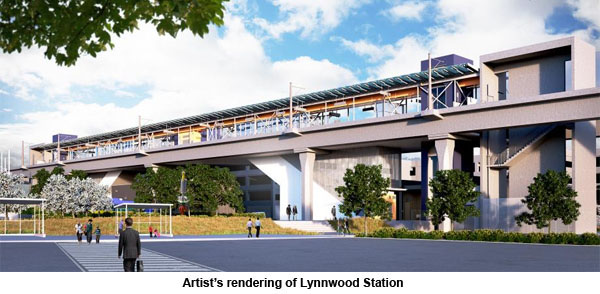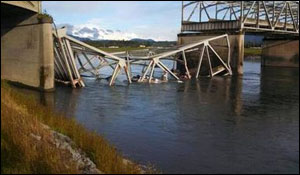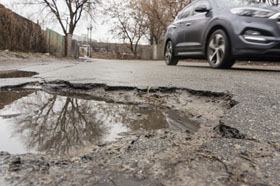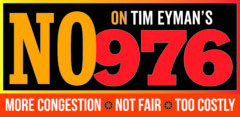OPINION
The high cost of Tim Eyman’s Initiative 976
By DAVID GROVES
LYNNWOOD (Sept. 6, 2019) — This week, Sound Transit broke ground on the construction of the new 8.5-mile Lynnwood Link Extension, which will extend light rail north from Seattle’s Northgate by four stations to Lynnwood city center. When it’s finished in 2024, folks in south Snohomish County will be able to ride Link Light Rail to downtown Seattle’s Westlake Park in 28 minutes, with trips every 4 to 6 minutes during peak travel times.

With an estimated 47,000 to 55,000 daily riders by 2026, this $2.8 billion project will provide traffic relief, cleaner air, and good jobs with 2,000 worker-years of union labor. Puget Sound voters approved not only this investment, they have also approved plans to extend light rail all the way north to Everett, and south to Federal Way — and eventually to Tacoma.
 But that won’t happen if Tim Eyman has his way.
But that won’t happen if Tim Eyman has his way.
Our state’s infamous initiative huckster has been held in contempt of court (repeatedly) in his trial for breaking state campaign finance laws. He’s filed for bankruptcy. He’s a chair shoplifter. But he’s still got something to try to sell you this fall: $30 car tabs.
If you buy what Eyman’s selling, the cost to our state’s transportation infrastructure and economy would be extraordinary.
If approved in November, Eyman’s Initiative 976 would cost billions, not just for Sound Transit, but also for critical transportation infrastructure across the state — from Seattle to Spokane, Bellingham to Vancouver, Anacortes to Zillah. Cities small and large would lose tens of millions of dollars in funding to pay for road construction, maintenance and local transit service.
In all, the I-976 fiscal impact statement estimates it would wipe out some $4 billion in state transportation investment over the next six to 10 years. And it threatens many billions more in transportation funding across the state, jeopardizing progress on everything from the I-5 widening at Snoqualmie Pass to the North-South freeway/US 395 project in Spokane.
 I-976 would cut repairs of dangerous highways, cut retrofitting bridges and overpasses, cut public transit, cut ferry system maintenance, cut Amtrak Cascades rail service to British Columbia, cut money for the Washington State Patrol, and more.
I-976 would cut repairs of dangerous highways, cut retrofitting bridges and overpasses, cut public transit, cut ferry system maintenance, cut Amtrak Cascades rail service to British Columbia, cut money for the Washington State Patrol, and more.
I-976 means more congestion, more dangerous roads, and more hardship for vulnerable seniors, veterans and others with disabilities who rely on public transportation to survive. And I-976 means fewer jobs building and maintaining the infrastructure that Washington residents and businesses need for a thriving state economy.
Unions in Washington oppose I-976. Working people in this state have seen the damage done by Tim Eyman’s previous attempts to gut the Motor Vehicle Excise Taxes, and they want no part of it. That’s why the Washington State Labor Council, AFL-CIO and its 600-plus affiliated unions have voted to oppose I-976.
But some have said that we need not worry because, even if I-976 passes, it is certain to face a legal challenge and likely to be thrown out by the courts — as happened with Eyman’s previous car-tab cutting initiatives (I-695 and I-776).
 If the courts rule as they have in the past, a successful legal challenge of I-976 may only protect the projects for which bonds have already been sold, like the light-rail expansion currently under way. It wouldn’t help all the city road repair and maintenance budgets, it wouldn’t help the ferry system, it wouldn’t help transit, and it wouldn’t help many highway and transportation infrastructure projects that are planned but have yet to begin.
If the courts rule as they have in the past, a successful legal challenge of I-976 may only protect the projects for which bonds have already been sold, like the light-rail expansion currently under way. It wouldn’t help all the city road repair and maintenance budgets, it wouldn’t help the ferry system, it wouldn’t help transit, and it wouldn’t help many highway and transportation infrastructure projects that are planned but have yet to begin.
Tim Eyman likes to say, “Let the Voters Decide.” But the truth is that both Washington voters and the representatives they elected have voted repeatedly to fund multimodal transportation infrastructure in this state. Voters in Puget Sound area voted to expand light rail, commuter rail, express bus, and bus rapid transit projects by approving Sound Move in 1996, Sound Transit 2 in 2008, and Sound Transit 3 in 2016.
 The bottom line: Eyman is a huckster. He’s selling a tax cut and trying to convince us that there will be no consequences. But if we buy what he’s selling with I-976, we’ll pay a far higher price: more dangerous roads, worse traffic, more pollution, and fewer jobs.
The bottom line: Eyman is a huckster. He’s selling a tax cut and trying to convince us that there will be no consequences. But if we buy what he’s selling with I-976, we’ll pay a far higher price: more dangerous roads, worse traffic, more pollution, and fewer jobs.
David Groves is Editor of The Stand. For more information, visit no976.org.





